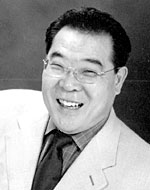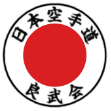 Junki Yoshida was born in Kyoto, Japan on December 7, 1949, the youngest of seven children. Living solely off income generated by the family restaurant, wearing hand-me-downs and suffering through limited means were a normal way of life for the Yoshida family. Little did Junki know that his ingrained survival instinct passed down by his family would later carry him to great success in a country halfway around the world.
Junki Yoshida was born in Kyoto, Japan on December 7, 1949, the youngest of seven children. Living solely off income generated by the family restaurant, wearing hand-me-downs and suffering through limited means were a normal way of life for the Yoshida family. Little did Junki know that his ingrained survival instinct passed down by his family would later carry him to great success in a country halfway around the world.
As a youngster, Junki always knew he enjoyed watching Japanese-dubbed movies and television shows from America. But, it wasn’t until he felt tears well in his eyes and a “squeezing sensation” in his chest while listening to the Star Spangled Banner during an Olympic broadcast that Junki knew destiny awaited him in America. His family, however, did not agree.
In 1968, at the age of 19, Junki made a drastic life-altering decision. With only $500 in his pocket, he purchased an airline ticket, boarded a plane and arrived at the Seattle-Tacoma airport on a cold January day. Leaving Japan against his family’s wishes, his only hope of returning to Japan with pride intact was to achieve a measurable success in America. Junki immediately cashed in his return ticket and bought a used Plymouth Valiant, his “home” for the next several months. It did not take long for Junki to discover that conquering the language barrier would be his first major challenge.
“I remember growing up in Japan watching the dubbed sitcom, ‘Father Knows Best.’ I secretly hoped Americans actually spoke Japanese like the TV show, even though their lips didn’t quite match,” laughs Junki Yoshida.
Finances became Junki’s second greatest challenge. As a way of encouraging his return to Japan, Junki’s family chose to cut him off financially. Though still living out of his car, his funds were quickly disappearing. Junki, in fact, was hospitalized and treated for starvation on two separate occasions. But, he refused to give up.
After a denial for admission to study theology at Seattle Pacific University due to his limited English-speaking skills, Junki split time working as a gardener for private residents and a kitchen employee for the airlines. He eventually enrolled at Highline Community College to study English where he traded classes for karate lessons, an art that he had learned as a young boy in Japan. To his pleasant surprise, he met a woman on campus who he would soon marry.
For the next five years, Junki and his bride, Linda, remained in Washington state where he trained, competed and taught karate. Upon opening his own karate schools, the number of students in his classes greatly increased, as did his martial arts ranking (eventually earning a 7th degree black belt), leading to his prestigious appointment as Japan Karate Federation’s Chief Instructor for the State of Washington and Oregon by Grand Master Konishi in Japan.
Soon after, Junki was asked to design and lead a police-training program based on his own defense techniques for law enforcement officers throughout the Northwest. The completion of this defense-training program eventually became a requirement for all correction officers” certification, police in-service training and SWAT team instructor courses in both Oregon and Washington.
Despite these substantial achievements, Junki, his wife and their three daughters desperately struggled to make ends meet. Revisiting Junki’s youthful lifestyle, he and his family had no money for frugal spending, let alone for buying presents to exchange for the holiday presents received from many of his karate students. What Junki did have, however, was his family’s 60-year-old “secret recipe” for a teriyaki-based cooking sauce. The Yoshidas cooked up batches of sauce in the basement of his karate school and gave them away as gifts.
What a surprise it was to Junki and Linda when the students began insisting on refills only a few weeks later. As word-of-mouth spread and demand grew, the Yoshidas decided to follow their friends” advice and market their unique product in 1982. With very little help from banks, Junki managed to raise $150,000 from relatives, friends and his father-in-law’s pension. Despite two near-bankruptcies, Junki refused to accept failure with the hopes of so many loved ones relying on the outcome of his future. He continued to work out of the karate school basement, buying empty syrup bottles t o fill by hand with sauce made in a ten-gallon pot.
Despite the incredible financial struggles he faced, Junki never lost faith in the product he based his family’s entire future upon Yoshida’s Gourmet Sauce. With persistence and humor, he eventually convinced the food buyer of a large grocery store chain to accept his product. Junki, himself, kept busy cooking samples for in-store demonstrations, using wild humor and crazy tactics to sell his sauce to passing shoppers. It was not long before his Gourmet Sauce was being sold in grocery retailers and club stores throughout the world.
Since the formation of his first company, Yoshida Food Products, Junki’s momentum and enthusiasm have never slowed. Over the past 20 years, he has gradually established a powerful conglomerate of 17 diverse companies with more than 300 employees under the Yoshida Group umbrella, generating an annual revenue of more than $180 million.
Such good fortune has allowed Junki the means to generously support an endless list of community and charitable organizations such as the Kids on the Block Program’s annual Yoshida’s Sand in the City fundraising event. In addition to serving as a Port of Portland Commissioner, Junki contributes his energies as a board member of Doernbecher Children’s Hospital Foundation, Troutdale Booster Club and Mt. Hood Community College Foundation.
Often awarded for his incredible contributions and lifetime achievements, Junki continues to travel the globe as an internationally acclaimed motivational speaker, entertaining and inspiring others in search of the “American Dream”.

